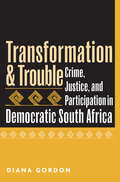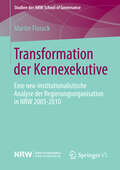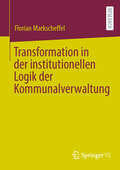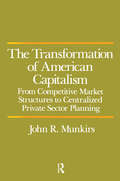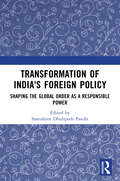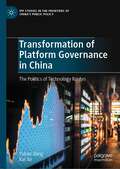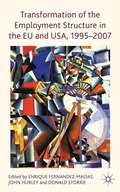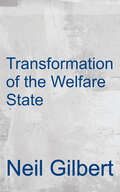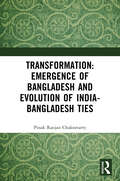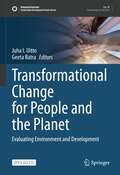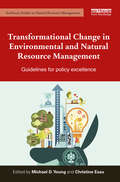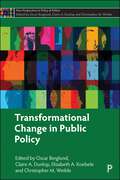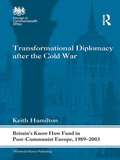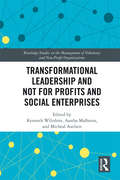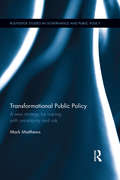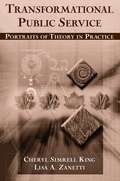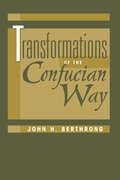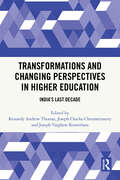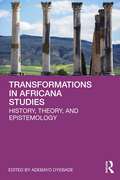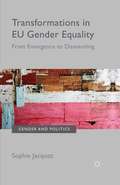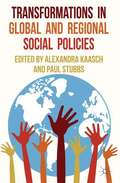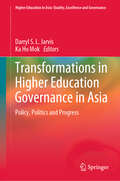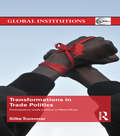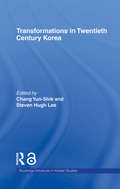- Table View
- List View
Transformation and Trouble: Crime, Justice, and Participation in Democratic South Africa
by Diana R. GordonViolence often increases after the lifting of authoritarian control, or in the aftermath of regime change. But how can a fledgling democracy fight crime without violating the fragile rights of its citizens? In Transformation and Trouble, accomplished theorist and criminal justice scholar Diana Gordon critically examines South Africa's efforts to strike the perilous balance between democratic participation and social control.
Transformation der Kernexekutive
by Martin FlorackRegieren braucht Organisation und Institutionen. Eine herausragende Rolle spielt hierbei die Kernexekutive, die Regierungshandeln koordiniert und steuert. Wie verändern sich diese formalen und informellen Institutionen nach einem Regierungswechsel? Welche Institutionen bleiben stabil, welche unterliegen grundlegendem Wandel? Wie groß ist der Einfluss politischer Akteure auf die Regierungsorganisation und welche Mechanismen liegen dem Wechselspiel institutioneller Stabilisierung und Veränderung zugrunde? Über die Beantwortung dieser Fragen hinaus verfolgt die vorliegende Studie drei weiterführende Ziele: Erstens geht es um eine empirische Analyse der Kernexekutive in Nordrhein-Westfalen. Damit rückt zugleich die bislang oftmals vernachlässigte Ebene der deutschen Länder ins Zentrum des Erkenntnisinteresses. Zweitens zielt die Studie auf eine methodische Erweiterung der Zugänge der Regierungsforschung durch die Methode der teilnehmenden Beobachtung. Die hiermit gewonnenen Innenansichten ermöglichen sowohl neue empirische als auch theoretische Perspektiven. Drittens geht es um den Anschluss des Themenfeldes an institutionalistische Theorieansätze. Die Studie zielt folglich auf einen Beitrag zu weiteren Theoriebildung im Feld der Regierungsforschung.
Transformation in der institutionellen Logik der Kommunalverwaltung
by Florian MarkscheffelDie Kommunalverwaltungen in Deutschland befinden sich in einem akuten Spannungsfeld: Der Reformdruck steigt, aufgrund diverser Herausforderungen wird eine neue Rolle gefordert, um gestaltend und moderierend auf die lokale sozial-ökologische Transformation zu wirken. Dem gegenüber steht jedoch eine fachlich wie gesellschaftlich debattierte Veränderungsresistenz der Verwaltung: Die Strukturen der Verwaltung scheinen ein Beharren auf etablierte Institutionen und Routinen zu befördern. Das vorliegende soziologische Buch adressiert diese Beharrungskräfte. Den theoretischen Rahmen stellen der Sozialkonstruktivismus sowie die institutionellen Logiken dar, empirisch wird eine Fallstudie im Modus des Transformativen Forschens mit explorierenden und narrativen Methoden ergründet. Die Stadtverwaltung der Fallstudie durchläuft einen Veränderungsprozess, der auf den Reformdruck eingeht. Im Fokus stehen die Erzählungen und Erlebnisse der Verwaltungsmitarbeitenden. Analysiert wurden die beschriebenen Institutionen und Routinen des Arbeitsalltages in der Verwaltungskultur, sowie die wahrgenommenen Herausforderungen im Change Prozess. Es zeigt sich, dass der Widerstand gegen Transformationen in der Struktur der Verwaltung verankert ist. Dementsprechendes Handeln der Mitarbeitenden wird in der institutionalen Ordnung befördert, unangemessenes Verhalten vermieden.
Transformation of American Capitalism
by John R. MunkirsDo Americans live in a planned economy? Most of us would say no. John Munkirs. however, argues that the American economy has “centralized private sector planning.” Assessing 138 major industries and 5 major market areas, the author shows how firms in a given industry are technologically, financially, and administratively interdependent. He then demonstrates how industries are both structurally and functionally interdependent and how a series of economic planning instruments evolved over the years that both allow and may even necessitate regional, national, and international private sector planning.
Transformation of India's Foreign Policy: Shaping the Global Order as a Responsible Power
by Santishree Dhulipudi PanditAnalysing the trajectory of Indian foreign policy through Prime Minister Narendra Modi’s vision, this book examines issues related to India’s growing profile at global multilateral forums, economy and trade, soft power, diaspora, and the intersection between foreign policy and national security. The subject matter in this book assesses Indian foreign policy by covering seven broad domains: security, multilateralism, economy and trade, diaspora, climate change, science and technology, and soft power. In addition, it also examines the notable achievements of Indian foreign policy over the past decade, describes Prime Minister Modi’s worldview and how it has been implemented; analyses the changes Modi has brought to Indian foreign policy behaviour and conduct; studies the evolution of Indian foreign policy over the last decade; and explores the new opportunities that could be potentially exploited in the future.Print edition not for sale in South Asia (India, Sri Lanka, Nepal, Bangladesh, Pakistan and Bhutan)
Transformation of Platform Governance in China: The Politics of Technology Routes (IPP Studies in the Frontiers of China’s Public Policy)
by Yuhao Jiang Kai JiaThe admiration of science and technology and the emphasis on political stability are two sides of the same coin in China. Therefore, China is more likely to take aggressive measures to promote or inhibit platform development than the United States and the European Union. But the uncertainty in the decision-making process is worrisome and calls for a broader discussion of the multiple political consequences of technology.
Transformation of the Employment Structure in the EU and USA, 1995–2007
by Enrique Fernández-Macías John Hurley Donald StorrieThis collection describes the changing structure of employment during the period of robust employment expansion that preceded the credit crunch and features contributions from a team of leading labour market researchers from Europe and the United States.
Transformation of the Welfare State: The Silent Surrender of Public Responsibility
by Neil GilbertSince the early 1970s, debate has raged over the "crisis of the welfare state." As the United States successfully exported its bootstrap brand of capitalism and an ever-broadening range of public activity came to be viewed through the prism of profit and loss, social welfare policies were closely scrutinized worldwide. Welfare was no longer seen as a means to remedy the inherent flaws of capitalism, but rather was recast as part of the very problem it was designed to solve. At the same time, the glaring systemic deficiencies of extant welfare systems-and the psychological toll of welfare dependency--became increasingly apparent, even to welfare's supporters. How much has really changed in the world of welfare? A great deal, according to Neil Gilbert, one of our most deeply engaged and thoughtful analysts of social welfare policy. <p><p>In this panoramic inquiry, Gilbert spans the globe to assess, in provocative yet dispassionate fashion, what welfare looks like in a free market world. From Sweden to the U.S., Gilbert finds a fundamental transformation in the welfare state--a turn away from broad-based entitlements and automatic benefits to a new, "enabling" approach defined by policies designed to promote privatization and labor force participation. He provides tangible evidence of how these new systems promote work and responsibility over protection and how they thicken the glue of civil society by diluting the pervasive role of government.
Transformation: Emergence of Bangladesh and Evolution of India-Bangladesh Ties
by Pinak Ranjan ChakravartyThis book explores India-Bangladesh bilateral ties over the past fifty years, tracing Bengal's history, the Partition, and the birth of Bangladesh. It examines Bangladesh’s domestic challenges, including political turmoil after the assassination of Sheikh Mujibur Rahman, military interventions, the secularism–theocracy conflict, the Chakma revolt and insurgency, communal tensions, and the nation’s economic recovery. The book provides an up-to-date analysis of bilateral issues and highlights PM Sheikh Hasina’s transformative role in shaping India-Bangladesh relations, with her leadership guiding Bangladesh into the future.
Transformational Change for People and the Planet: Evaluating Environment and Development (Sustainable Development Goals Series)
by Juha I. Uitto Geeta BatraThis Open Access book deals with the pressing question of how to achieve transformational change that reconciles development with environmental sustainability. It particularly focuses on the role of evaluation in finding sustainable solutions. Environment and development are closely interlinked, as are human health and ecosystem health. The pandemic that began in 2020 demonstrated in no uncertain terms how destruction of habitats has allowed hitherto unknown pathogens spill over to humans wreaking havoc on people’s lives and livelihoods. We are already seeing the impacts of global climate change in terms of heatwaves, forest fires and increased storms. The Sustainable Development Goals (SDGs) explicitly recognize the equal importance of the social, economic and environmental dimensions of development. In these turbulent times, when humankind faces multiple complex challenges it is essential to know that our responses are effective and that they make a positive difference. Evaluation can provide invaluable lessons to how we design policies, strategies and programs and how we allocate limited resources between competing priorities. This book brings together key thinkers and practitioners from the public and private sectors, from major multilateral organizations and from bilateral donor agencies, to present the latest knowledge and experience on how to evaluate interventions in the nexus of environment and development. The book does not promote any particular approach or methodology, but rather emphasizes the need for mixed methods to address the question at hand in the best and most suitable manner. It covers cases from a variety of fields, from climate change mitigation and adaptation, energy efficiency and renewable energy, natural resources management, biodiversity conservation and more.This book is not a conference proceedings although it has its roots in the Third International Conference on Evaluating Environment and Development organized by the GEF Independent Evaluation Office in October 2019. The conference brought together a larger number of established and upcoming evaluators, researchers and evaluation users from the Global North and South, representing a wide variety of organizations, to discuss the frontiers of environment and development evaluation. Following the conference, the editors identified and contacted the participants who made key contributions at the conference and asked them to develop their ideas and papers into book chapters according to a coherent plan.
Transformational Change in Environmental and Natural Resource Management: Guidelines for policy excellence (Earthscan Studies in Natural Resource Management)
by Mike Young Christine EsauThe aim of this book is to catalyse global interest in the pursuit of transformational changes in natural resource and environmental management. It is shown that transformational policy reforms involve fundamental shifts in strategy with far-reaching consequences for the structure of industries, the way people behave and the resources they use. Transformational reforms typically involve a decision to change a suite of institutional arrangements that will result, within a short period of time, in a paradigm shift and the emergence of an approach that will be recognised as being totally different to the arrangements that were previously in place. Transformational change is well established in business and can deliver outstanding results. In the world of policy development, however, many transformational policy reforms flounder. Unlike incremental policy reforms, they are often seen to be politically risky and prone to failure. Using examples of success and failure, coupled with insights from practitioners and academics who have succeeded in getting transformational reforms implemented, this book presents a set of guidelines for excellence in the pursuit of transformational policy reforms. It includes detailed case studies from Australia, China, Europe, New Zealand, South-east Asia and the USA.
Transformational Change in Public Policy (New Perspectives in Policy and Politics)
by Oscar Berglund, Claire A. Dunlop, Elizabeth A. Koebele and Christopher M. WeibleHow can Public Policy scholarship contribute to transformational societal change? In this collection of essays, previously published in Policy &amp; Politics, the authors explore different avenues towards more transformational Public Policy research. This includes being braver in what questions we ask; more inclusive in the actors we study and audiences we speak to; and more diverse in our theories and methods. The chapters address issues such as crises, democracy, participation, disasters, and paradigm change. This book is essential reading for academics involved in Public Policy and Politics, and those invested in the improvement of our societies during turbulent times.
Transformational Diplomacy after the Cold War: Britain’s Know How Fund in Post-Communist Europe, 1989-2003 (Whitehall Histories)
by Keith HamiltonThis book examines the 'Know How Fund', Britain’s bilateral technical assistance programme in post-communist central and eastern Europe, devised in response to the end of the Cold War. The Know How Fund (KHF) was the technical assistance programme which Margaret Thatcher’s government launched in the spring of 1989 to encourage Poland’s transition from communism to democracy and free-market capitalism. It was subsequently extended to other countries of central and eastern Europe and might be considered a novel experiment in what the US secretary of state, Condoleezza Rice, would later term ‘transformational diplomacy’. Drawing upon still-closed records of the Cabinet Office, the Department for International Development (DFID) and the Foreign and Commonwealth Office, this book explores the political origins of the KHF. In particular, the author examines its influence upon the transitional process in the lands of the former Soviet bloc; its part in attenuating the potentially destabilising effects of revolutionary change in Europe; the interdepartmental cooperation and rivalry to which its administration gave rise in Whitehall; and the links forged between officials and the worlds of business, finance and academe in project design and implementation. The volume offers new insights into Britain’s reactions to the collapse of communism in central Europe and the Soviet Union; the role of aid in the making and conduct of British foreign policy; and the significance of New Labour’s establishment of DFID as a separate government department. This book will be of much interest to students of British Foreign Policy, Diplomacy Studies, European history, Post-Communist Transitions and IR in general.
Transformational Leadership and Not for Profits and Social Enterprises (Routledge Studies in the Management of Voluntary and Non-Profit Organizations)
by Ken Wiltshire Aastha Malhotra Micheal AxelsenRecent decades have seen a significant transformation of the not-for-profit (NFP) sector. This includes rise in the number of organisations and people employed, shift from charities and philanthropic agencies to hybrid social enterprise business models, competing stakeholder interests and increasing expectations regarding accountability and transparency. The role of NFPs has also become more complex – they not only serve the disadvantaged and fulfil social needs but also actively advocate for and implement public policies and promote social and economic inclusion. The growth and complexity has brought with it a need for innovative and entrepreneurial approaches to leadership that stems from an in-depth understanding of the changing nonprofit landscape. Addressing this need, for Not for Profits and Social Enterprises will help readers navigate extant challenges by drawing on conceptual literature, both theoretical and empirical and emphasising practical real world experience through case studies and vignettes The key aim of this book is to help existing and future NFP leaders at all organisational levels to support their organisations and employees and in turn clients and communities, through theoretical insights and practical approaches by focusing on transformational leadership aspects for contemporary Not for Profits. for Not for Profits and Social Enterprises is key reading for researchers, academics and policy makers in the areas of Non-profit Management, Leadership, Public Sector Management and Charity Management as well as related disciplines such as Philanthropy and Social Entrepreneurship.
Transformational Public Policy: A new strategy for coping with uncertainty and risk (Routledge Studies in Governance and Public Policy)
by Mark MatthewsTransformational Public Policy examines how governments can more effectively handle uncertainty and risk in an uncertain and changing world. Unpredictable and changing circumstances often bring nasty surprises that can increase waste in governance and public debt. This book illustrates how new methods derived from signal processing techniques can improve the practice of public policy by transforming it through rapid learning and adaptation. Interventions are processes of discovery, not compliance. Transformational Public Policy shows readers how the power of hypothesis testing in governance can be deployed. The book argues that public policy can be framed as tests of competing hypotheses subject to diagnostic errors. The aim is to learn how to reduce these diagnostic errors through cumulative experience. This approach can reduce the impact of negative unintended consequences -- a topic of great interest to policy makers and academics alike.
Transformational Public Service: Portraits of Theory in Practice
by Cheryl King Lisa ZanettiEveryone who aspires to more effective public service should read this book. It provides a compelling antidote to the managerial focus of theory and practice in public administration. Written with the aim of inspiring and rekindling a mission for public service, Transformational Public Service weaves together theory and stories from actual practice to show that public service can (and does) advance the goals of democracy, inclusiveness, and social and economic justice. Eight practitioners from government and non-governmental organizations at all levels - from the street to the executive office - tell their personal stories of transformational public service. Theory, poetry, and popular culture references are woven around the stories. Both students and practitioners will discover new ways of thinking in this book that will enable them to transform their own administrative practices. As the authors note in their prologue: "As we listened to these stories, we heard people say that public service can be and is transformational (transforms institutions, practices, and people's lives and experiences) in ways that serve democracy, engagement, and social and economic justice. The public service they practice is collaborative, humanistic, emancipatory, inclusive, and diverse."
Transformations Of The Confucian Way
by John BerthrongFrom its beginnings, Confucianism has vibrantly taught that each person is able to find the Way individually in service to the community and the world. John Berthrongs comprehensive new work tells the story of the grand intellectual development of the Confucian tradition, revealing all the historical phases of Confucianism and opening the readers eyes to the often neglected gifts of scholars of the Han, Tang, and the modern periods, as well as to the vast contributions of Korea and Japan. The author concludes his revelatory study with an examination of the contemporary renewal of the Confucian Way in East Asia and its spread to the West. }From its beginnings, Confucianism has vibrantly taught that each person is able to find the Way individually in service to the community and the world. For over 2,600 years, Confucianism has sustained a continual process of transformation and growth. In this comprehensive new work, John Berthrong examines the vitality and expansion of the Confucian tradition throughout East Asia and into the entire modern world. Confucianism has been credited with being the dominant social and intellectual force shaping the enduring civilizations of East Asia. If we are to grasp the history of East Asia, we must understand the role that Confucianism has played in the social and cultural formation of the entire region. Just as civilizations are ever-changing, there has been nothing timeless or static about Confucianism.Berthrongs study is unique in its discussion of each of the historical and regional phases of the development of the Confucian Tao. All too often, Confucian studies have focused exclusively on the classical early period and the great thinkers of the later neo-Confucian revival in the Sung Ming dynasties. Berthrongs work opens the readers eyes to the often neglected gifts of scholars of the Han, Tang, and the modern periods, as well as to the vast contributions of Korea and Japan. The author concludes this revelatory study with an examination of the contemporary renewal of the Confucian Way in East Asia and its recent spread to the West. }
Transformations and Changing Perspectives in Higher Education: India's Last Decade
by Joseph Varghese Kureethara Kennedy Andrew Thomas Joseph Chacko ChennattuserryThis book reveals the intricacies of the Indian education system, especially those that surged in the past decade. It covers several perspectives of global higher education, wherein the dynamic trends and frameworks are explicated for a better understanding of the curriculum design and delivery of higher education in India. It facilitates students’ learning and experiences, wherein the post-pandemic insights for learning from remote locations could be gleaned.This volume looks at the complexities in the functioning of educational institutions and suggests novel approaches and interventions that are crucial for the educational framework of India. It attempts to draw theoretical implications of the educational system and uses empirical evidence for recommending actionable processes.As a multidisciplinary work covering international policies and global perspectives on higher education, this book would be useful to students, teachers of education, political science, public administration, international relations, economics, psychology, cognitive science, life skills education, counselling, sociology, gender studies, social work, performing arts, and disaster management. It will also be an indispensable resource for researchers, academicians, professionals, government and policy makers of the country and the world at large.
Transformations in Africana Studies: History, Theory, and Epistemology
by Adebayo OyebadeThis book introduces readers to the rich discipline of Africana Studies, reflecting on how it has developed over the last fifty years as an intellectual enterprise for knowledge production about Africa and the African diaspora. The African world has always had a wealth of indigenous knowledge systems, but for the greater part of the scholarly history, hegemonic Western epistemologies have denied the authenticity of African indigenous ways of knowing. The post-colonial era has seen steady and deliberate efforts to expand the frontiers of knowledge about black people and their societies, and to Africanize such bodies of knowledge in all fields of human endeavor. This book reflects on how the multidisciplinary discipline of Africana Studies has transformed and reinvented itself as it has sought to advance knowledge about the African world. The contributors consider the foundations of the discipline, its key theories and methods of knowledge production, and how it interacts with popular culture, Women’s Studies, and other area studies such as Ethnic and Afro-Latinix Studies. Bringing together rich insights from across history, religion, literature, art, sociology, and philosophy, this book will be an important read for students and researchers of Africa and Africana Studies.
Transformations in EU Gender Equality: From emergence to dismantling (Gender and Politics)
by Sophie JacquotIn a context of economic and budgetary crisis, this book presents a long-term analysis of the transformations of EU gender equality. It analyses the mechanisms of construction, consolidation and deconstruction of this policy and questions the effects of its current dismantling.
Transformations in Global and Regional Social Policies
by Paul Stubbs Alexandra KaaschThis book discusses key issues in global and regional social policy, exploring Bob Deacon's pioneering approach to regulation, rights and redistribution. It addresses the role of international actors in shaping social policy and discusses the problems and possibilities of new alliances for global social justice.
Transformations in Higher Education Governance in Asia: Policy, Politics and Progress (Higher Education in Asia: Quality, Excellence and Governance)
by Ka Ho Mok Darryl S. L. JarvisThis book documents experimentation with various policy and governance approaches that produce structural differences in the composition and organisation of Asia’s higher education systems. In view of the wide variation in the public and private provision of higher education, it showcases how issues of access, equity and modes of participation are addressed, how institutional and programme quality are managed and how academic labour is treated and developed. The book both maps these differences and analyses the country-level dynamics, policy approaches and the problems faced by a variety of states in Asia in the race to develop competitive higher education systems. Focusing on the intersection of governance and higher education policy, it addresses the challenges facing higher education in Asia and the national responses of governments in terms of the organisation of the sector.
Transformations in Research, Higher Education and the Academic Market: The Breakdown of Scientific Thought
by Alexandra Waluszewski Sharon Rider Ylva HasselbergThis volume tackles head-on the controversy regarding the tensions between the principles underlying Academe on the one hand, and the free market on the other. Its outspoken thesis posits that seemingly irresistible institutional pressures are betraying a core principle of the Enlightenment: that the free pursuit of knowledge is of the highest value in its own right. As 'market principles' are forced on universities, inducing a neoteric culture of 'managerialism', many worry that the very characteristics that made European higher education in particular such a success are being eroded and replaced by ideological opportunism and economic expediency. Richly interdisciplinary, the anthology explores a wealth of issues such as the phenomenon of bibliometrics (linking an institution's success to the volume and visibility of publications produced). Many argue that the use of such indicators to measure scientific value is inimical to the time-consuming complexities of genuine truth-seeking. A number of the greatest discoveries and innovations in the history of science, such as Newton's laws of mechanics or the Mendelian laws of inheritance, might never have seen the light of day if today's system of determining and defining the form and content of science had dominated. With analytical perspectives from political science, economics, philosophy and media studies, the collection interrogates, for example, the doctrine of graduate employability that exerts such a powerful influence on course type and structure, especially on technical and professional training. In contrast, the liberal arts must choose between adaptation to the dictates of employability strategies or wither away as enrollments dwindle and resources evaporate. Research projects and aims have also become an area of controversy, with many governments now assessing the value of proposals in terms of assumed commercial benefits. The contributors argue that these changes, as well as 'reforms' in the managerial and administrative structures in tertiary education, constitute a radical break with the previous ontology of science and scholarship: a change in its very character, and not merely its form. It shows that the 'scientific thinking' students, researchers, and scholars are encouraged to adopt is undergoing a rapid shift in conceptual content, with significant consequences not only for science, but also for the society of which it is a part.
Transformations in Trade Politics: Participatory Trade Politics in West Africa (Global Institutions)
by Silke TrommerThis book examines the evolution and application of participatory trade politics in West Africa and discusses the theoretical implications for political economy and global governance approaches to trade policy-making. The author traces the involvement of a network of West African global justice Non-Governmental Organizations (NGO), local NGO and movement platforms, and trade unions in the negotiations for an Economic Partnership Agreement with the European Union. Building on this empirical analysis, she develops a theoretical framework of trade policy formation that is not limited to conceptualizing trade as a policy field aimed exclusively at regulating exporting and importing activities in the global economy. Instead, she analyzes how material and ideational spheres interact in the way in which communities set the rules that enable them to trade across long distances. Attempting to reconcile demands for inclusivity with current economic policy-making, the author reframes the way in which we theoretically pose questions of who makes trade policy decisions, through which mechanisms and why trade policy-making practices change, or resist change. Transformations in Trade Politics will be of interest to students and scholars of International Political Economy, Global Governance, Social Movement Studies, International Economic Relations, International Trade Relations, African Politics, The Politics of African/International Development, EU politics and EU-African Relations.
Transformations in Twentieth Century Korea (Routledge Advances in Korean Studies #Vol. 7)
by Steven Hugh Lee Chang Yun-ShikThis edited collection traces the social, economic, political, and cultural dimensions of Korea’s dramatic transformation since the late nineteenth century. Taking an interdisciplinary approach, the chapters examine the internal and external forces which facilitated the transition towards industrial capitalism in Korea, the consequences and impact of social change, and the ways in which Korean tradition continues to inform and influence contemporary South Korean society. Transformations in Twentieth Century Korea employs a thematic structure to discuss the interrelated elements of Korea’s modernization within agriculture, business and the economy, the state, ideology and culture, and gender and the family. The essays in this volume encompass the Choson dynasty, the colonial period, and postcolonial Korea. Collectively, they provide us with an original and innovative approach to the study of modern Korea, and show how knowledge of the country’s past is critical to understanding contemporary Korean society. With contributions from a number of prominent international scholars within sociology, economics, history, and political science, Transformations in Twentieth Century Korea incorporates a global framework of historical narrative, ideology and culture, and statistical and economic analysis to further our understanding of Korea’s evolution towards modernity.
